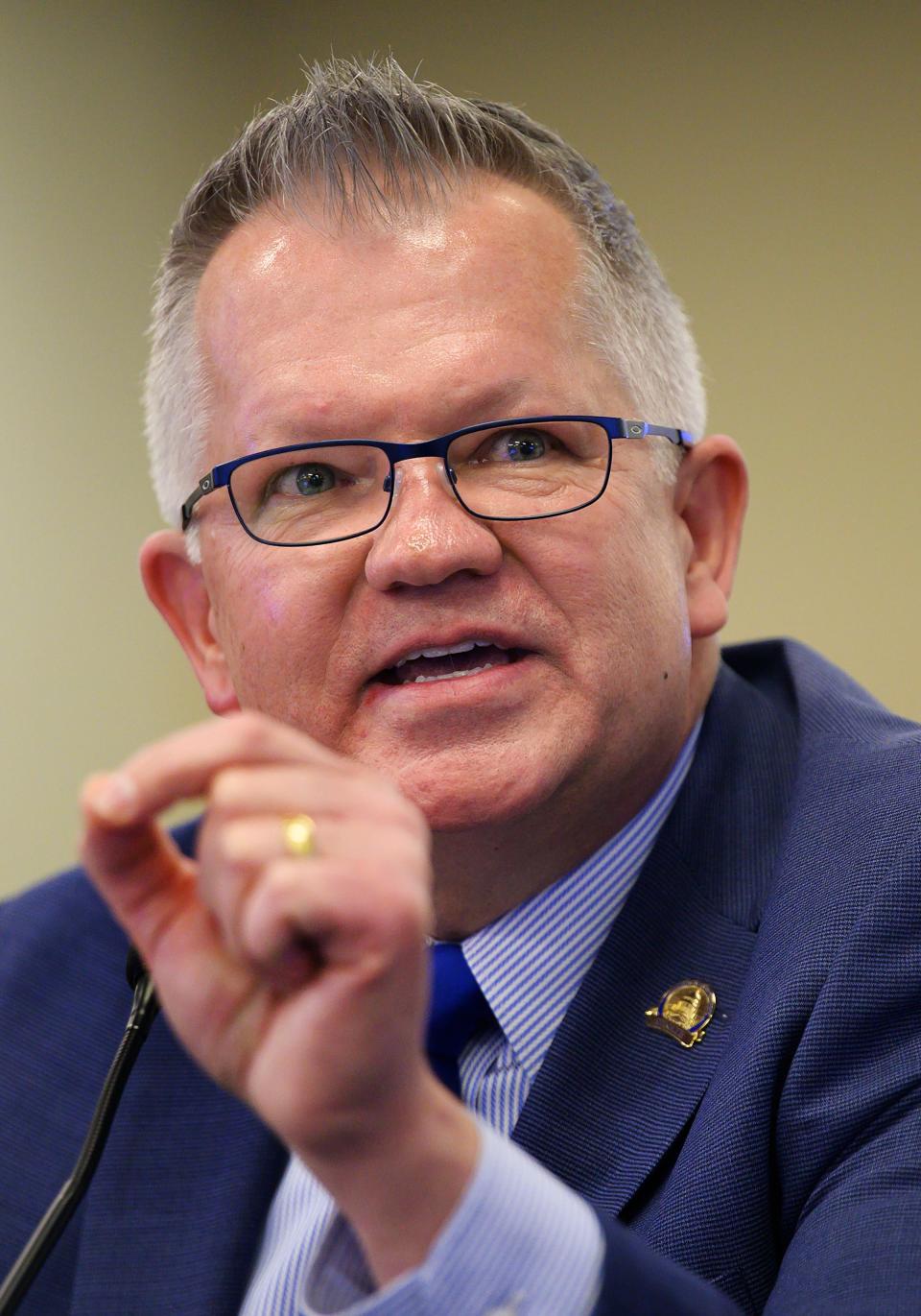Nuclear energy in Kentucky? Lawmakers show early bipartisan support
Kentucky lawmakers showed early support for nuclear energy Wednesday, approving a bill and joint resolution in committee that could foster future development of nuclear energy in the commonwealth.
Senate Bill 198 would establish the Kentucky Nuclear Energy Development Authority, a nonregulatory state agency tasked to "support and facilitate the development of the nuclear energy ecosystem."
The agency would be attached to the University of Kentucky Center for Applied Energy Research, with an advisory board chaired by its director, Rodney Andrews. Other officials and stakeholders would join Andrews on the board.
The related joint resolution directs Kentucky's Public Service Commission, responsible for regulating the state's utilities, to make the staffing and organizational changes necessary to handle future "applications for the siting and construction of nuclear energy facilities."
Both the bill and the joint resolution are sponsored by Sen. Danny Carroll, R-Benton, a self-described "nuclear geek."
He pointed to a "renaissance in nuclear energy" during Wednesday's committee meeting and said Kentucky needs to position itself to take advantage of nuclear energy advancements.
And Christine Csizmadia, senior director for state government affairs at the Nuclear Energy Institute, told the committee there's been growing support for nuclear in other state legislatures around the country in recent years.
"It's important for us to lay a solid foundation, to make sure we don't get left behind," Carroll said. "Kentucky has always had inexpensive energy. That's been one of our strengths that has drawn business and industry to our state. We've got to make sure that that continues in the future."
Lawmakers turn to nuclear as coal declines

Carroll's legislation represents continued momentum for nuclear energy in Kentucky.
In 2017, he sponsored a bill that overturned the state's nuclear moratorium. And last year the General Assembly approved a joint resolution leading to the creation of the Nuclear Development Workgroup.
The workgroup submitted a final report to the legislature late last year, concluding "that there are no insurmountable barriers to nuclear energy development in Kentucky."
However, the report also pointed to several significant challenges in nuclear energy development, including cost, management of nuclear waste, regulatory hurdles, "public acceptance" and more.
Lawmakers' interest in nuclear energy comes amid a dramatic decline in the state's once-massive coal industry. LG&E and KU, among other Kentucky utilities, have largely turned to natural gas and renewable energy as aging coal-fired power plants have reached retirement.
And in committee, Carroll said several coal power plants in Kentucky have already been identified as potential candidates for conversion to nuclear energy facilities.
"What we're trying to do with nuclear is in no way an indictment on the coal industry, natural gas, renewables, any other source of energy," Carroll said. "In our commonwealth, we take the all-of-the-above approach, and that's going to continue."
But as coal power declines, he added, "We're going to have to start looking for other sources of baseload energy to power this country. And I'm convinced, without doubt, that nuclear is the answer."
More: Is Kentucky's legislature waging another 'war on Louisville'? Depends on who you ask
Controversy around nuclear energy
Carroll told committee members he receives many messages "expressing concerns of the old technologies," and said, "we have a long way to go in educating our state" on nuclear energy.
He also called on the public to read up on advancements in nuclear energy, including its potential for Kentucky's economic development.
In the past, nuclear energy has stoked controversy among some environmentalist groups and others, including the Sierra Club. Opponents of nuclear energy often cite concerns about safety, long-term storage of nuclear waste and whether placing bets on nuclear energy distracts from the transition to solar energy and other renewables.
Kentucky has a troubled history with radioactive waste. The infamous Maxey Flats site, a radioactive waste dump in Fleming County, and the Paducah Gaseous Diffusion Plant, a uranium enrichment site, were both ultimately designated as Superfund sites by the U.S. Environmental Protection Agency, warranting costly cleanup efforts.
Terrell Holder, chair of the Kentucky chapter of the Sierra Club, said the chapter is currently neutral on Carroll's bill, as it only establishes an agency, and does not have an "immediate impact" on Kentucky's adoption of nuclear energy.
Holder said while some members remain opposed to nuclear power, others have recognized Kentucky's slow progress on reducing fossil fuel emissions, and believe "nuclear could be a good tool to keep in the toolbox in the long run."
Connor Giffin is an environmental reporter for The Courier Journal and a corps member with Report for America, a national service program that places journalists in local newsrooms to report on under-covered issues. The program funds up to half of corps members’ salaries, but requires a portion also be raised through local community fundraising. To support local environmental reporting in Kentucky, tax-deductible donations can be made at courier-journal.com/RFA.
Learn more about RFA at reportforamerica.org. Reach Connor directly at cgiffin@gannett.com or on X @byconnorgiffin.
This article originally appeared on Louisville Courier Journal: Nuclear energy in Kentucky? Lawmakers show early bipartisan support

